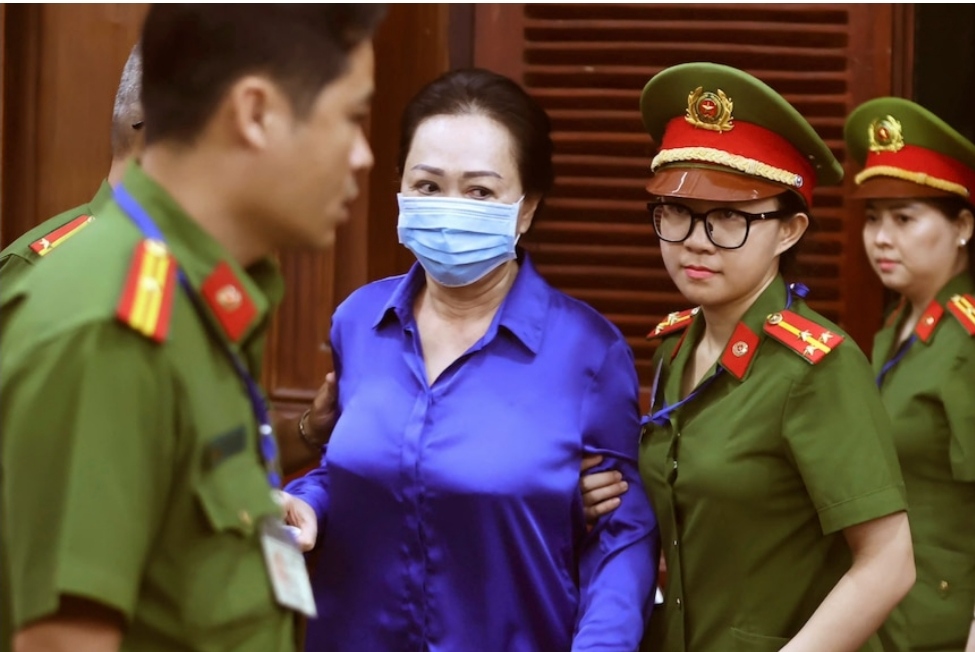Vietnamese court rejects Truong My Lan’s appeal against death penalty for multi-billion-dollar fraud
By Brianna Morris-Grant

Vietnamese real estate tycoon Truong My Lan has been sentenced to death for financial crimes
The woman behind Vietnam’s largest-ever financial fraud case has lost her appeal against her death penalty sentence.
Real estate tycoon Truong My Lan embezzled $US12.5 billion ($19.3 billion) — almost 3 per cent of Vietnam’s 2022 GPD.
According to prosecutors at the time, the total damages caused by the fraud amounted to almost double that amount.
Lan has pledged to pay back the billions of debt owed, but on Tuesday a judge ruled the case carried “extremely serious consequences”.
During a hearing at the High People’s Court in Ho Chi Minh City, the judge said there was “no basis to reduce the death penalty”.
However Lan was still scrambling this week to amass at least three-quarters of the embezzled funds.
Under Vietnamese law, if she returns the money, her sentence could still be commuted to life in prison.
Truong My Lan’s sprawling real estate empire
Lan, born in 1956, got her start by helping her mother sell cosmetics at Ho Chi Minh City’s oldest market.
In 1992 she founded and chaired real estate company Van Thinh Phat Group, which is now one of Vietnam’s richest real estate firms.

Business woman Truong My Lan
The company’s sprawling empire includes multiple five-star hotels, luxury apartments, offices and shopping centres.
One of them — Ho Chi Minh City’s Sherwood Residence, complete with swimming pools, fitness centres and a cinema — was Lan’s residence up until her arrest.
Lan controlled the city’s largest bank by assets, the Sai Gon Joint Stock Commercial Bank, from 2012 to 2022.
The bank’s very existence was thanks to Lan’s help.
A year before the takeover, Lan — a key player in the country’s financial industry — orchestrated a merger of beleaguered SCB bank with two other lenders, in coordination with Vietnam’s central bank.
It was this move, according to prosecutors, that put her at the helm of a sophisticated criminal enterprise.
‘Ghost companies’ and the ‘burning furnace’ crackdown in Vietnam
Lan was accused of indirectly owning more than 90 per cent of the bank, a charge she denies.
On paper, she owned only 5 per cent of the shares, but a court ruled she had the lion’s share through family, friends and staff.
Between 2012 and 2022, she used the bank as her cash cow, approving loans to thousands of “ghost companies” both in Vietnam and internationally.
She then paid bribes to government officials to cover her tracks.

Truong My Lan’s was Vietnam’s largest-ever fraud case.
One of those officials has been sentenced to life in prison for taking millions of dollars in bribes.Her driver, state media reported, transported the equivalent of more than $US4.4 billion in cash from SCB’s headquarters to her nearby home and to the head offices of Van Thinh Phat.
According to the court, Lan’s actions “pushed SCB into a state of special control”, eroding people’s “trust in the leadership of the [Communist] party and state”.
A national corruption crackdown dubbed the “burning furnace” saw numerous officials and members of Vietnam’s business elite arrested.
Along with Lan, 85 others were sentenced on a range of charges, from bribery to abuse of power, to appropriation, to violations of banking law.
Lan’s trial began on March 5 this year. She pleaded not guilty to the embezzlement and bribery charges.
Authorities said 2,700 people had been summoned to testify and hundreds of lawyers were involved.
The evidence amounted to 104 boxes weighing six tonnes, according to the BBC.’I felt like I was losing my mind’The case sent shock waves across Vietnam.
Nguyen Thi Huong, who had spent a decade selling baby products, was among the tens of thousands who lost everything in the fraud.
“When I learned that I had lost all the money I had deposited at SCB bank, I felt like I was losing my mind,” Ms Huong told AFP.
She added she had stopped sleeping, her health had deteriorated and she could no longer afford her children’s tutoring.
“I sat by my father’s grave, and wished he would take me with him in death,” she said.
Another, fish sauce seller Hoang Thi Cuc, had spent her life savings of $US140,000 buying bonds from the bank.
“I feel disappointed, it’s overwhelming, and it makes me shake all over,” Ms Cuc said last month after Lan was ordered by a court to compensate victims.
“I need to know how I’ll be paid, not just empty promises. There’s nothing left to lose. We have been pushed to the edge.
“Lan was sentenced to death by a court in Ho Chi Minh City in April.
Truong My Lan has been sentenced to death over Vietnam’s largest-ever financial fraud case.
State media has reported 11 death sentences in Vietnam since 2010, and the death penalty is applied for more than three dozen offences including murder, rape, corruption and fraud.
However, according to a report by the Vietnam Committee on Human Rights, capital punishment statistics are classified as “state secrets”.
Lan was also sentenced to life in prison for money laundering in a separate case last month.
In this case, she was found guilty of obtaining property by fraud, money laundering and illegal money transfers, according to state media.It was unclear whether she would also appeal against that sentence.
Lan’s request for a ‘lenient and humane’ approach
Lan’s appeal, handwritten across more than five pages, asked the court to consider a more “lenient and humane approach”.
According to Vietnamese law, she could still be able to escape the death penalty if she returns at least 75 per cent of the assets — a sum of more than $US9 billion.
She told the court in Ho Chi Minh City last week the “quickest way” to repay the funds would be to “liquidate” SCB and sell its assets.
“I feel pained due to the waste of national resources,” she said, adding she felt “very embarrassed” by the charges.
“Every night I still feel tormented and wonder why my family and I are in this situation.”Her lawyers have argued for leniency on financial grounds, saying it would be easier for her to repay the money if she was handed a life sentence.
“The total value of her holdings actually exceeds the required compensation amount,” lawyer Nguyen Huy Thiep told the BBC.
“However, these require time and effort to sell as many of the assets are real estate and take time to liquidate.
“Her lawyer said she had admitted guilt and shown remorse, but prosecutors said the consequences of her actions were “unprecedented”.
Forty-seven other people have also lodged appeals in an attempt to get lighter sentences.
The three-week appeal was attended by 100 lawyers, according to state media.
Lan was joined in court by her husband, who is himself appealing a nine-year sentence for violating banking regulations.




